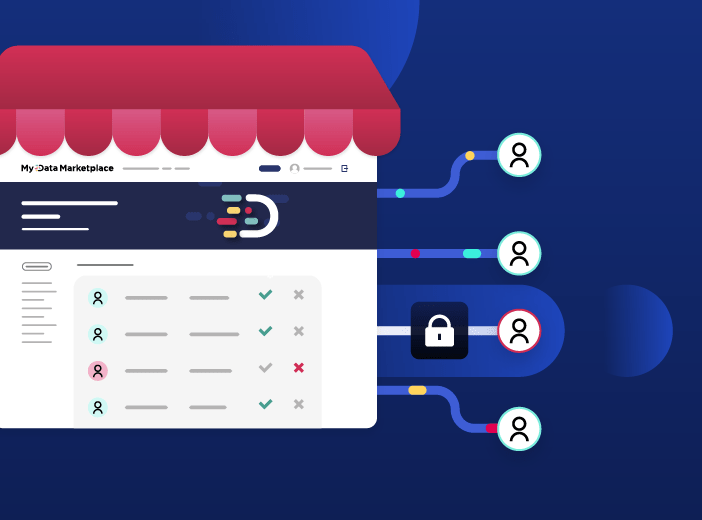New Opendatasoft research finds data democratization still in its infancy

How are organizations embracing greater data sharing and reuse? The latest Opendatasoft/Odoxa Data Democratization Study highlights that while organizations are becoming more mature in their use of data, there’s still a way to go to enable data-centricity.
As we move into 2024, seamless, straightforward and fast access to data for all is at the heart of successful data strategies. Ensuring everyone has the ability to find, use and share relevant data creates value and impact, both inside businesses and across society as a whole. Achieving data democratization therefore benefits us all.
To track progress around data use and sharing we run an annual study, in conjunction with research institute Odoxa. Based on a survey of senior private and public sector executives, the Data Democratization Study monitors changing data maturity levels and provides key metrics and best practices to help organizations to transform their operations by adopting a data-centric approach.
This year, 431 senior executives from public and private organizations with 500 or more employees took part in the research, which was strengthened by in-depth interviews by six Chief Data Officers (CDOs), from a range of sectors. They provided their perspectives on the results and shared insights based on their experiences. Overall, the study highlighted three key findings:
Organizations understand the value of data democratization but are not yet prioritizing it
On the positive side, organizations overwhelmingly see data use as a strategic necessity. 90% of decision-makers believe that the use of data is an important part of their organization’s digital transformation, up from 85% last year. 80% use shared data as part of their day-to-day activities.
However, just 44% say that data use is a priority in their organization today, while the same percentage think they are ahead of the curve when it comes to data usage. This shows that the majority of decision-makers aren’t prioritizing the use and sharing of data above other activities. No wonder that just 13% of staff feel that their employer is a data leader.
Attitudes to data vary considerably between teams. Three-quarters (74%) of those in departments such as Innovation and Digital Strategy which rely on data see it as priority, followed by site/subsidiary management (64%). However, the majority of leaders in areas such as logistics, production, human resources, and customer service consider data to be a secondary priority.
Increasing the priority of data sharing
Talking to CDOs highlights a key issue that relegates data projects to the bottom of priority lists – Return on Investment (ROI). Senior management favors projects that deliver a quick financial return, yet often data projects require long-term investment to deliver results.
That means there’s a clear need to raise awareness of the value of data to underpin lasting benefits to the organization. CDOs have to educate their senior colleagues about the importance of data to long-term success. They have to find use cases across the business that deliver high levels of value in order to change views of the importance of data projects.
“Many organizations may be tempted to focus solely on generating revenue or ROI in relation to data. Their economic vision therefore leads them to underinvest in data foundations.”
Matthieu Blanc, CDO of French public sector financial institution Caisse des Dépôts
“I think we need to ask ourselves questions as early as possible: what do we want to do with our data and how do we use it to deliver value?”
Philippe Vincent, CDO of credit insurer Coface
“We need to identify projects where data serves the business and increases market share or competitive advantage. As long as this ROI driver is not found, driving data-centricity remains complicated.”
Guiraude Lame, CDO of wealth management company Natixis
Access to data at scale is not yet a reality
To reuse data it has to be easily available to employees across the organization. Yet, just 37% of decision-makers felt that employees had access to all the information they needed for their jobs. A further 37% said staff had partial access, while over a quarter (26%) provided no access at all to company-wide data.
The major barrier to access is that data is stuck in departmental silos, preventing sharing or the unlocking of its full value. This is generally because departmental data owners feel that keeping information to themselves increases their power and stops other managers questioning their results or practices. Breaking down these silos requires a collective awareness that sharing data so it can be consumed across the organization delivers greater benefits to everyone than hoarding it in silos.
“For a very long time, departments thought that if they owned the data, they had the power. This runs counter to the whole concept of data democratization. Instead, they need to understand that if they provide access to the data they generate, they actually have greater power as they are able to direct people to the right place to find useful data. It’s a radical change in philosophy and culture.”
Matthieu Blanc, CDO of Caisse des Dépôts
“There are silos because very often we find the equation ‘one job = one tool = one database’. To overcome silos, you need to set up exchanges and organize a value chain, encourage inter-departmental synergies and ensure that projects deliver results.”
CDO, Energy Sector
“Today, there is still a lot of reluctance to share data. One reason is that some may see it as a loss of their usefulness or influence since others will be able to access this data without them. Removing this reluctance can be done by directives from senior managers (if they are on board with the concept), but the most effective way is to educate data owners to become more aware of the benefits for all.”
Florent Verrière CDO of EDF
Data portals: creating a one-stop shop for data
A data portal is essential to enable everyone to easily and quickly access data from across the organization. However, the research shows that just 8% of organizations have an internal portal to underpin data access. Showing their relative lack of maturity, in 32% of organizations executives said data was sent via files, with 27% sharing it in meetings.
“One of our challenges is to eradicate information that circulates in files that are not controlled. It is therefore important for employees to be able to find the right data on their own in order to meet their needs. The purpose is to provide employees with data that is referenced, that we are sure is the right data and that can be used. “
Florent Verrière, CDO of energy company EDF.
Decision-makers want more concrete progress to accelerate data democratization
Today, 61% of the decision-makers surveyed are generally satisfied with their organization’s choices in terms of data use, meaning that over a third (39%) don’t feel that their needs are being met. Only 66% of decision-makers believe it is quick and easy to access the data they need, and for half (50%), accessing data requires specific skills, or requires them to speak to an expert analyst (48%).
Backing this up, nearly half (48%) believe there’s a gap between their organization’s ambitions to do more with data, and the actual position today. This demonstrates a concrete need for action, putting in place data foundations, infrastructure and culture.
Looking forward, over half of leaders (59%) are confident that things will change for the better, with their organization implementing a centralized approach to managing internal data, such as by recruiting a CDO, setting up a data governance framework or deploying a data portal.
The unclear role of the CDO
However, even though 85% of decision-makers say their organization already has a Chief Data Officer, there is a widespread confusion about their role. Only 49% of executives say that the CDO role is properly defined, leading to issues around scope and decision-making. To overcome this, CDOs need to gain agreement on their responsibilities and use their position to drive clarity and results.
“Every time I go to meet new managers, I explain to them what my daily life consists of – creating a data culture, building data infrastructure, and supporting projects to solve problems. It is important to share progress and to publicize successful initiatives and projects.”
Jean-Yves Mahé, CDO of the French Ministry for Europe and Foreign Affairs
“To succeed in democratizing the use of data, we need strong sponsorship from a convinced Executive Committee that is ready to put in the right resources. You need to show them that data is vital across all business processes.”
CDO, Energy Sector.
“On the executive side, they have not always fully understood what the role of the CDO is and the importance of data governance, which is still something abstract to them.”
Florent Verrière, EDF
Moving forward towards data democratization
On the positive side, the latest Data Democratization Study shows that progress has been made since last year. However, challenges remain in terms of turning vision into reality, justifying investment and changing culture. Overcoming these obstacles requires CDOs to take the lead, educating senior management, helping to create a company-wide data culture and adopting the right approaches to break down silos and centralize data sharing through data portals. Only then will organizations become truly data-centric, enabling data democratization.

Data contracts are key to building trust in data in distributed environments, and are at the heart of data products. We look at how to build and enforce data contracts through a data product marketplace to unlock greater value from data.

It can be hard to understand exactly what a data product is, given the many ways that the term is defined and applied. To provide clarity this article provides a business-focused definition of a data product, centered on how it makes data accessible and usable by the wider organization, while creating long-term business value.

